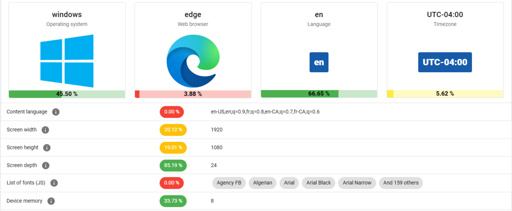- cross-posted to:
- [email protected]
- cross-posted to:
- [email protected]
Amidst the glossy marketing for VPN services, it can be tempting to believe that the moment you flick on the VPN connection you can browse the internet with full privacy. Unfortunately this is quite far from the truth, as interacting with internet services like websites leaves a significant fingerprint. In a study by [RTINGS.com] this browser fingerprinting was investigated in detail, showing just how easy it is to uniquely identify a visitor across the 83 laptops used in the study.
As summarized in the related video (also embedded below), the start of the study involved the Am I Unique? website which provides you with an overview of your browser fingerprint. With over 4.5 million fingerprints in their database as of writing, even using Edge on Windows 10 marks you as unique, which is telling.



Part of the reason Tor is good is because it generates the same fingerprint for all users (part of the reason you shouldn’t install additional extensions on it, by the way). Mullvad browser tries to do this but without the Tor network.
How would tor do that? As far as I understand the fingerprint is an aggregate of multiple very specific variables ie https://amiunique.org/fingerprint. Sure tor might set some (or a lot) to a default but some are very difficult to circumvent such as the rendering of specific shapes and text.